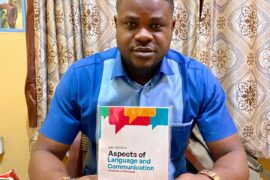DOES GRAMMAR MEAN “BIG BIG ENGLISH”?
Ganiu Abisoye Bamgbose (GAB)
The colloquial term, “big big English”, is used among Nigerians to mean uncommon and high sounding words. So when you purchase rather than buy; and get flabbergasted rather being surprise, then, you are said to be using “big big English”. This phenomenon called “big big English” which in standard usage can be described as having a wide vocabulary is erroneously assumed by many non-native speakers of English to be the basis of grammar. Anyone with a wide vocabulary is labelled a grammarian and assumed to possess grammatical competence. This is absolutely not the case. So, what is grammar and who is a grammarian?
Grammar can be explained from two perspectives. First, it is the intuitive knowledge of correctness that a native speaker possesses in his or her language. A Yoruba man does not need a formal education to know the grammar of his language. He does not need to go to school to tell if a sentence is well formed or not in his Yoruba language. Such naturally acquired knowledge of one’s language is the first meaning of grammar. We can say therefore that we all are grammatically competent in our native languages. The second definition of grammar has to do with the rules that guide the use of a language. A person can be called a grammarian if she or he can account for the rules that guide the formation of sentences in a language.
This second definition is crucial to second language learning. Anyone who hopes to speak a language fluently and confidently must make a conscious effort to familiarise her or himself with the rules that guide the language. This can only be formally acquired. For instance, the knowledge of English grammar helps you to tell that the word “round” can be called a noun in isolation but it can perform any other function depending on its usage as seen in the sentences below:
The round table is lovely (adjective).
I should round off soon (verb).
This round was boring (noun).
Move round the house (adverb).
The sun goes round the earth (preposition)
The knowledge of grammar can even help you adjudged sentences as grammatical even when they seem somewhat nonsensical as seen in the use of GAB below:
GAB teaches English daily (noun).
Did you GAB the correction (verb)?
She committed a blunder and got that GAB effect from everyone around (adjective).
Ultimately, the knowledge of grammar has to to do with a good mastery of how words should be combined into sentences. As much as a wide vocabulary makes one speak and write elegantly, a good knowledge of which words should be used in what positions is the basis of fluency. Few words that are creatively combined enhance communication than a robust lexical repertoire with no meaningful combination.
Before you start reading a dictionary; get a book on fundamental grammar.
(c) 2018 Ganiu Abisoye Bamgbose (GAB)
Doctoral Candidate of English, University of Ibadan



